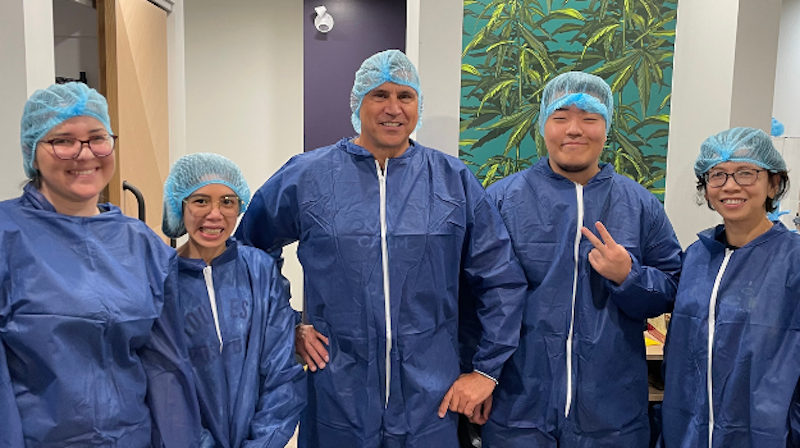News
Sask Polytech and Mother Labs collaborate on mildew project
Published on January 26, 2024 by Special to the oz.
 Photo: Contributed/Saskatchewan Polytechnic
Photo: Contributed/Saskatchewan Polytechnic Saskatchewan Polytechnic’s BioScience Applied Research Centre partnered with Saskatchewan-based cannabis genetics and lab services company, Mother Labs, on an innovative project aimed at transforming the screening of plants for agronomically important traits. The collaboration focuses on the development of PCR-based molecular markers, with a specific emphasis on screening for mildew resistance in Mother Labs’ cannabis plants.
Mother Labs approached Sask Polytech to explore the possibility of incorporating a PCR-based method of detection for agronomic traits into their breeding program. By leveraging Sask Polytech’s applied research expertise, Mother Labs aims to enhance their breeding and screening capabilities.
“Our partnership with Sask Polytech symbolizes a significant stride towards addressing a spectrum of challenges in the cannabis industry,” says Jordan Hannah director of operations at Mother Labs.
“We are committed to this collaboration to advance our understanding and management of various cultivation issues, including but not limited to powdery mildew. This relationship not only underscores our dedication to improving cannabis genetics but also our pursuit of innovative solutions for the evolving needs of the industry. We look forward to the continued advancements and contributions this partnership will bring to the field of cannabis genetics and genetic development.”
Under the guidance of research chair Blaine Chartrand, Theo Oates and Mitchie Kenept, two students from the BioScience Technology program have played a pivotal role in this applied research project. Their primary responsibilities included extracting DNA from tissue samples and utilizing PCR-based markers to screen breeding lines for the presence or absence of specific genes.
“PCR tests, similar to the COVID PCR tests previously used for out-of-country travel, were employed by our students in the investigation of cannabis plants,” says Chartrand. “Specifically, our students used PCR testing to detect plants that contained genes for resistance to powdery mildew and to determine their sex for breeding applications. Preliminary PCR-based results were presented at the 2023 Applied Research Student Showcase last May.”
The polymerase chain reaction (PCR) is a method widely used to make millions to billions of copies of a specific DNA sample rapidly, allowing scientists to amplify a very small sample of DNA sufficiently to enable detailed study.
There are many benefits to students participating in applied research. “Collaborating with Mother Labs allowed students to gain insights into the cannabis sector through facility tours and firsthand learning experiences,” adds Chartrand.
Oates is a Sask Polytech BioScience Technology alumnus who is continuing his education at USask with a biology degree. He shares that nothing compares to the complicated nature of cannabis, “It’s a fascinating plant that is not well understood. Delving into the genomic analysis of cannabis holds numerous advantages, and we’ve only just begun to unravel its complexities.”
Oates volunteered to be a part of the Mother Labs applied research project during finals and shares that while the experience was somewhat demanding during a stressful academic time, it was undeniably rewarding. “I was able to accurately determine the sex of 40 different cannabis plants using PCR tests. By the end of the research project, my confidence in my abilities had significantly grown. Blaine put a lot of trust into me and this research experience, along with my training, gave me the confidence I needed to enter a lab knowing I could do the job.”
Oates observes there are lots of benefits to using cost-effective PCR-based tests to identify the sex of cannabis plants, including removing male plants to avoid accidental pollination. Other benefits include optimizing cultivation practices, improving the quality of the final product, streamlining production and patenting genetic markers. The applied research experience enabled Oates to help classmates with their studies and put him on the path for success at USask.
Kenept, a second year BioScience Technology student also worked on the Mother Labs project last fall. Kenept used PCR tests to see if plants were resistant or susceptible to powdery mildew. “The work with Mother Labs gave me a better understanding of the work I will do after I complete my diploma and also gave me more confidence during my lab work and experiments at Sask Polytech,” says Kenept. “I suggest all students take every opportunity to do applied research work. Take the risk, don’t be afraid.”
The significance of this applied project extends beyond cannabis agronomic traits. With increasing demand for intellectual property protection in the cannabis industry, having a genetic fingerprint of a particular strain is crucial.
As the project progresses, it is anticipated that additional markers related to powdery mildew and other important disease resistance will emerge, further enhancing the screening process.
Eligible Sask Polytech students can apply for Saskatchewan Innovation and Opportunity Applied Research Scholarships of $1,000 and $500. These awards are intended to provide an opportunity for students to engage in applied research partnerships, similar to the Mother Labs partnership. Engaging in applied research projects that solve everyday problems allows students and their faculty supervisors to successfully address industry needs and make a real difference in their communities and in their fields of study.
The Mother Labs project was funded by the National Research Council of Canada Industrial Research Assistance Program (NRC-IRAP) and exemplifies the power of collaboration between academia and industry. Through the development of PCR-based markers and the optimization of screening techniques, this project promises to have a far-reaching impact on the cannabis industry and beyond.
Learn more at saskpolytech.ca/research.
Leave a comment on our Facebook page.
© Copyright 2024 Okanagan Z. | About the oz.
Report a Typo or Inaccuracy
We strive to avoid typos and inaccuracies. However, on occasion we make mistakes. We value your contributions and help in correcting them.